OUR EVENTS
Month
- April 2025
- March 2025
- February 2025
- January 2025
- December 2024
- November 2024
- October 2024
- September 2024
- May 2024
- April 2024
- February 2024
- January 2024
- December 2023
- November 2023
- October 2023
- September 2023
- August 2023
- July 2023
- June 2023
- May 2023
- April 2023
- March 2023
- February 2023
- January 2023
- December 2022
- November 2022
- October 2022
- September 2022
- August 2022
- July 2022
- June 2022
- May 2022
- April 2022
- March 2022
- February 2022
- January 2022
- December 2021
- November 2021
- October 2021
- September 2021
- August 2021
- July 2021
- June 2021
- May 2021
- April 2021
- March 2021
- February 2021
- January 2021
- December 2020
- November 2020
- October 2020
- September 2020
- August 2020
- July 2020
- June 2020
- May 2020
- April 2020
- March 2020
- February 2020
- January 2020
- December 2019
- November 2019
- October 2019
- September 2019
- August 2019
- July 2019
- June 2019
- May 2019
- April 2019
- March 2019
- February 2019
- January 2019
- December 2018
- November 2018
- October 2018
- September 2018
- August 2018
- June 2018
- May 2018
- April 2018
- March 2018
- February 2018
- January 2018
- December 2017
- November 2017
- October 2017
- September 2017
- August 2017
- June 2017
- May 2017
- April 2017
- March 2017
- February 2017
- February 2015
Prospects for Southeast Asian Engagement with the United States Under Trump II
Join the Center for Foreign Policy Studies at Seton Hall University for a discussion with Dr. See Seng Tan, President and CEO of International Students Inc., Research Advisor at the S. Rajaratnam School of International Studies and Senior Associate at the Centre for Liberal Arts and Social Sciences at Nanyang Technological University, Singapore. Dr. Tan is the author of 19 books and one of Singapore’s leading experts on foreign affairs. The discussion will focus on Southeast Asia’s engagement with the U.S. during the first Trump administration, and whether engagement with the second Trump administration will differ. Professor Ann Marie Murphy, NYSEAN co-founder, will moderate the discussion.
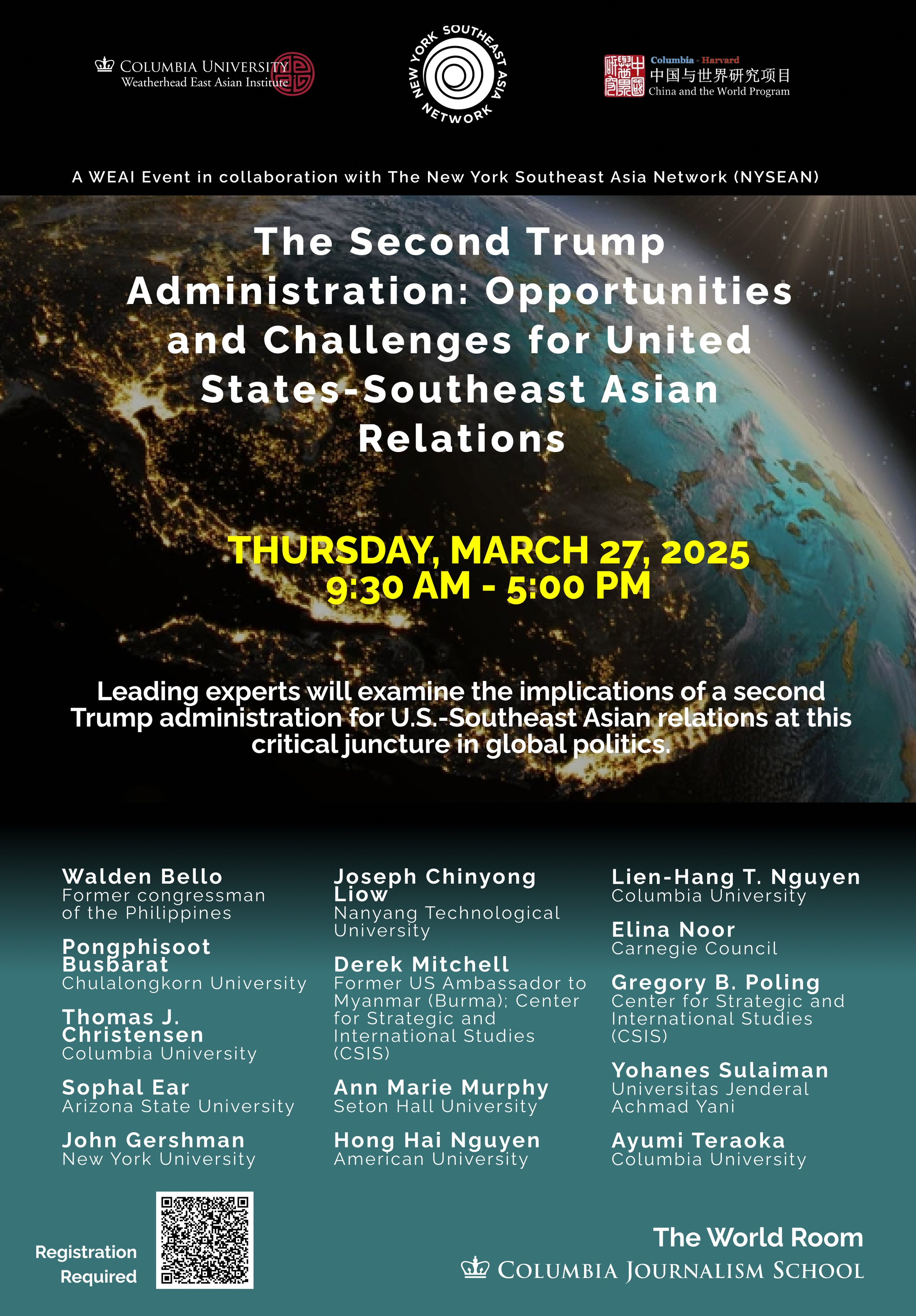
The Second Trump Administration: Opportunities and Challenges for United States-Southeast Asian Relations
Join NYSEAN, Weatherhead East Asian Institute, and the Columbia-Harvard China and the World program for a conference featuring Walden Bello, Pongphisoot Busbarat, Thomas Christensen, Sophal Ear, Joseph Chinyong Liow, Derek Mitchell, Ann Marie Murphy, Hong Hai Nguyen, Lien-Hang Nguyen, Elina Noor, Praslhant Parameswaran, Gregory Poling, Yohanes Sulaiman, and Ayumi Teraoka. These leading experts will examine the implications of a second Trump administration for US-Southeast Asian relations at this critical junction in global politics.
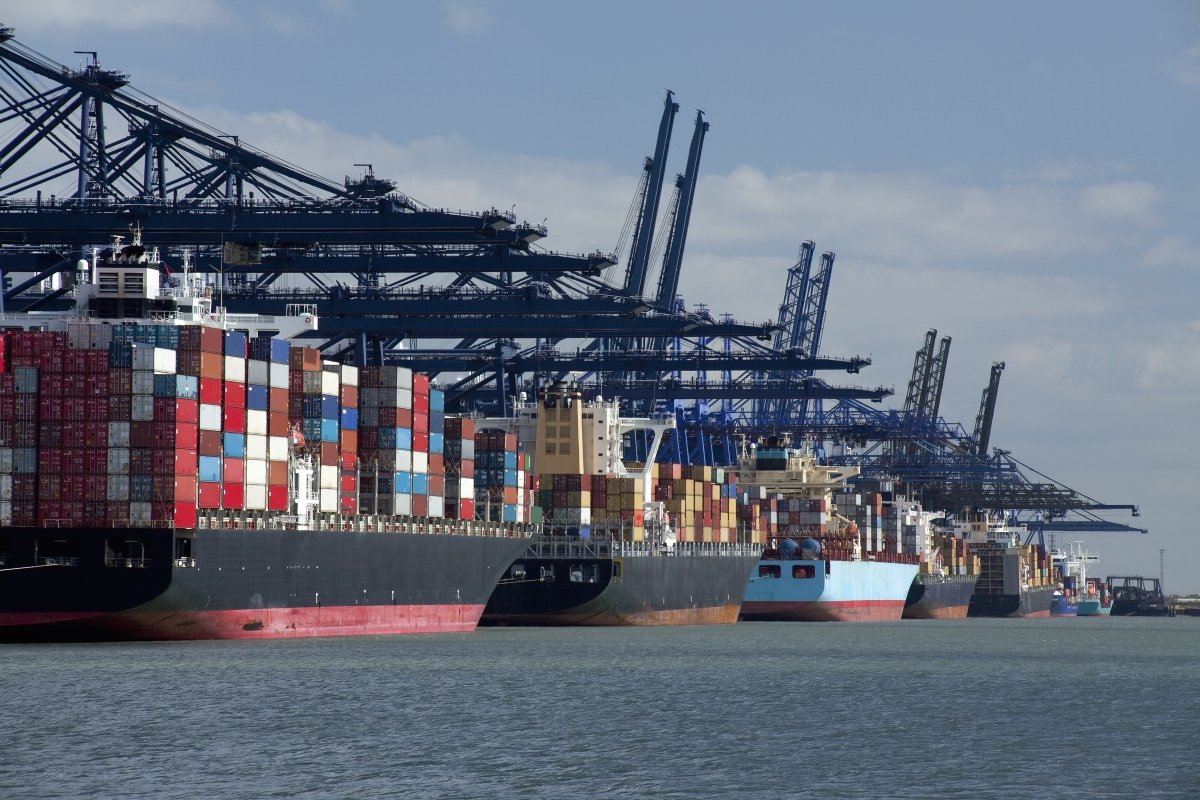
That’s What (Economic) Friends Are For: Working with Indo-Pacific Partners to Enhance Supply Chain Resilience
Join the Asia Society Policy Institute (ASPI) for a panel discussion featuring Iman Pambagyo, former Chief Trade Negotiator for Indonesia; Jayant Menon, Senior Fellow at ISEAS – Yusof Ishak Institute; Yasuyuki Todo, Professor of Economics at Waseda University; Wendy Cutler, ASPI Vice President. These experts from the Indo-Pacific and the U.S. will explore the impact of U.S. friendshoring policy, discussing its challenges, lessons learned, and how it can be enhanced to strengthen supply chains and boost economic prosperity.
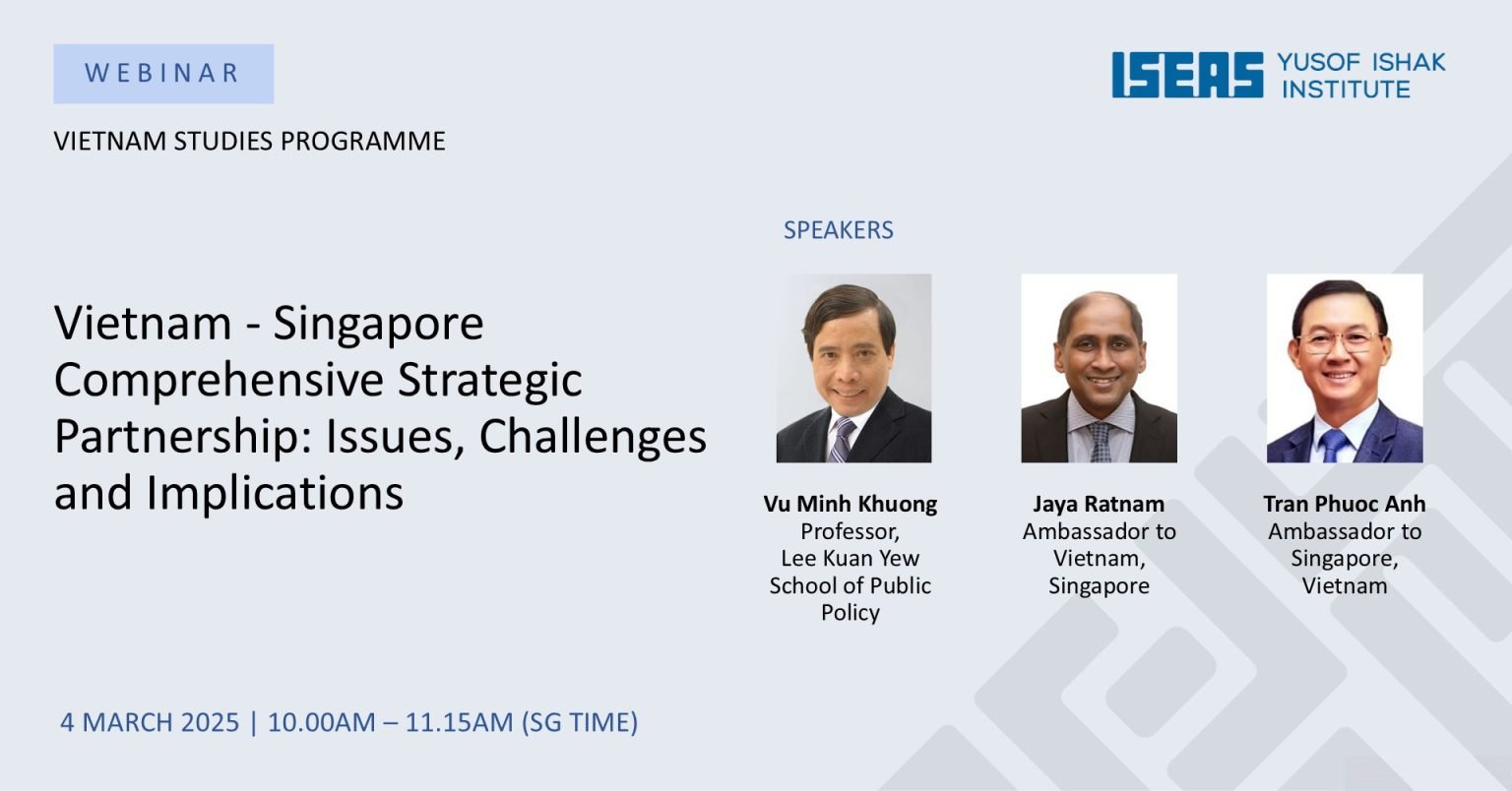
Vietnam – Singapore Comprehensive Strategic Partnership: Issues, Challenges, and Implications
Join the Vietnam Studies Programme at ISEAS – Yusof Ishak Institute for a webinar featuring Vu Minh Khuong, Professor at the Lee Kuan Yew School of Public Policy, Jaya Ratnam, Singapore’s Ambassador to Vietnam; and Tran Phuoc Anh, Vietnam’s Ambassador to Singapore. This panel will explore the evolution of Vietnam-Singapore relations, analyze the opportunities and challenges of their upcoming Comprehensive Strategic Partnership (CSP), and discuss strategies to strengthen and deepen bilateral ties for a more substantive and impactful future.

Social Media and Politics in Southeast Asia
Join NYSEAN for a book talk by Merlyna Lim, Canada Research Chair in Digital Media and Global Network Society, Professor of Communication and Media Studies, and Director of the ALiGN Media Lab at Carleton University. Social Media and Politics in Southeast Asia (Cambridge University Press, 2025) highlights the dual role of social media in both fostering grassroots activism and enabling autocratic practices of algorithmic politics, notably in electoral politics.

Roundtable on Islam and National Identity: From the Perspectives of Contemporary Indonesia, Malaysia, and Singapore
Join the Regional and Cultural Studies Programme at ISEAS - Yusof Ishak Institute for a seminar featuring Andar Nubowo, Muhammad Faiz bin Fadzil, and Mohamed Imran Mohamed Taib. The panel will be about Islam and the construction of modern national identity in Indonesia, Malaysia, and Singapore.

Walking the Tightrope: Balancing Language, Politics and Culture in Chinese Diasporic Identities in Southeast Asia
Join the Sigur Center for Asian Studies at the George Washington University for a conference on the Chinese Diaspora in Southeast Asia. This event brings together papers from scholars of maritime Southeast Asia who document and analyze the diverse but often precarious practices of everyday management of linguistic and cultural identities of diasporic Chinese in the Southeast Asian region.

Desiring Distinctions: Totalizing Images and Coercions of Community in Multiracial, Multilingual Singapore
Join the Southeast Asia Program and the Mario Einaudi Center for International Studies at Cornell University for a talk by Joshua Babcock, Assistant Professor of Anthropology at Brown University, who will discuss the raciolinguistic distinctiveness and national identity in Singapore.
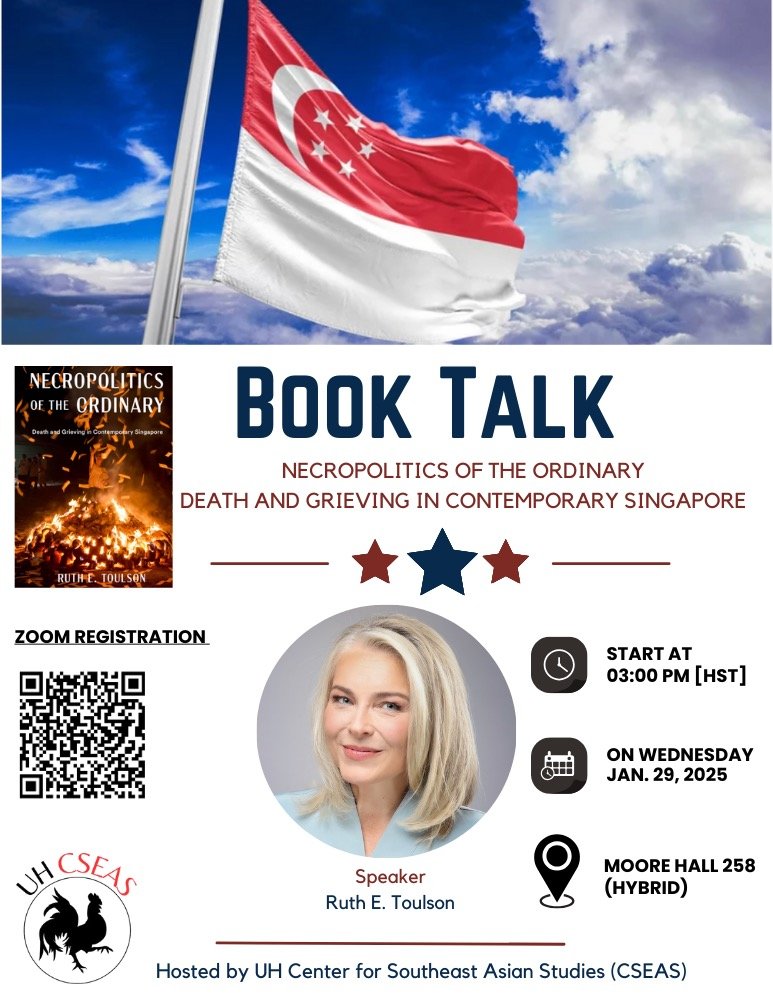
Necropolitics of the Ordinary: Death and Grieving in Contemporary Singapore
Join the Center for Southeast Asian Studies at the University of Hawaii at Manoa for a book talk by Ruth Toulson, Assistant Dean of Undergraduate Studies and Faculty Member in the Division of Liberal Arts at the Maryland Institute College of Art. As an anthropologist and trained mortician, Toulson discusses the scope of and resistance to state power over the dead upon the removal of cemeteries in Singapore.

Can National Identity Trump Ethnic Favoritism? Experimental Evidence from Singapore
Hosted by the Southeast Asia Program at Cornell University, Risa J. Toha, Wake Forest University, will discuss her field research concerning Singapore’s demographic composition and its implications for ethnic politics, social harmony, and nation-building.

Migrant Worker Rights in Singapore: Advocacy, Legal Frameworks and Prospects for Change
Debbie Fordyce, President of Transient Workers Council Too, and Laavanya Kathiravelu, Associate professor at Nanyang Technological University, will discuss their advocacy and research on migrant worker issues in Singapore. This event is sponsored by Columbia University’s Weatherhead East Asia Institute and NYSEAN.
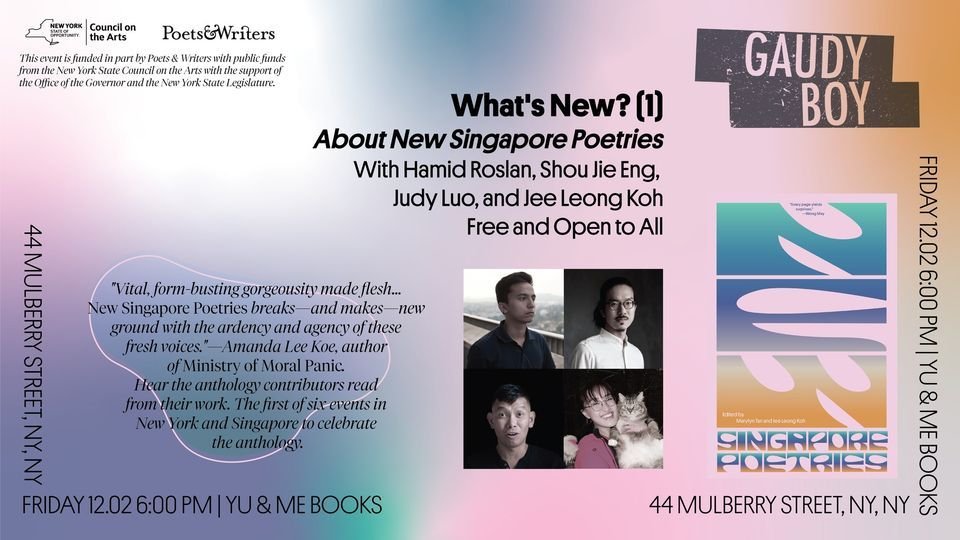
What's New? About New Singapore Poetries
Yu & Me Books will celebrate and amplify Asian literary voices by hosting the upcoming authors Hamid Roslan, Shou Jie Eng, Judy Luo, and Jee Leong Koh. Each author will perform readings from their respective works.
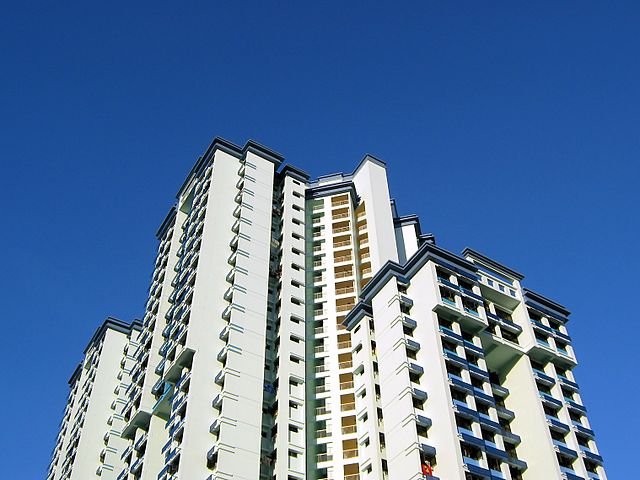
Public Subsidy/Private Capital: Political Economic Contradictions in Singapore's Public Housing System
Professor Chua Beng Huat, National University of Singapore, and Dr. Suraya Ismail, University of Cambridge, will discuss the issues that have emerged from the sale and ownership of 99-year leases on public housing units in Singapore. This workshop is hosted by the Saw Swee Hock Southeast Asia Centre at the London School of Economics and Political Science.

Singapore Literature Festival in NYC
The 5th Singapore Literature Festival will explore the theme Archipelago Dreaming through the works of various Singaporian creatives. This event is hosted by Singapore Unbound and co-sponsored by the Asian American Writers’ Workshop, the NYU Postcolonial, Race and Diaspora Studies Colloquium, and the Asian/Pacific/American Institute at NYU.

Making Kin and Ecofeminism from Singapore
In her groundbreaking book, which re-centers Singapore women in the overlapping discourses of family, home, ecology, and nation, Angelia Poon will focus on the crafts, minds, bodies, and subjectivities of a diverse group of women in a talk organized by the Nanyang Technological University.

(Re)contextualizing the Đồng Dương Buddhist Art Gallery at the Museum of Cham Sculpture in Da Nang
Organized by the SOAS Centre of Southeast Asian Studies and SOAS Southeast Asian Art Academic Programme, this lecture by Duyen Nguyen examines the Đồng Dương Buddhist gallery at the Museum of Cham Sculpture in Da Nang. She argues that the current display is an attempt to re-contextualize the original landscape of the Đồng Dương monastery and the significance of the Đồng Dương Buddhist art tradition. However, it offers insufficient interpretation due to the absence of some objects that have resulted in a de-contextualized display.

Must We Decolonize the Museum? Sacred and Ritual Art and the Raffles Collection in Singapore
Unraveling the legacies of colonialism is a pertinent question for Singaporeans today. The Asian Civilisations Museum (ACM) inherited the “ethnology” collection of the 19th-century Raffles Library and Museum, as well as archaeological material from the Malay World by H. G. Quaritch Wales in the 1930s. Organized by the SOAS Centre of Southeast Asian Studies and SOAS Southeast Asian Art Academic Programme, two ACM curators consider how decoloniality might take shape at the museum and will focus on curatorial and exhibition practices.

Mining the Museum: Contemporary Art and Decolonial Practice in Southeast Asia
In his groundbreaking 1992 exhibition/intervention, artist Fred Wilson extracted materials from the Maryland Historical Society’s collection and curated them as disconcerting displays of historical violence. Taking a cue from Wilson’s intervention, Pamela N. Corey and Vera Mey will discuss case studies from Southeast Asia in which contemporary artists use the museum as a site and medium for decolonial critiques. This lecture is organized by SOAS Southeast Asian Art Academic Programme and the Asian Civilisations Museum in Singapore.

Helping America Regain Its Mojo: Singapore's Policy Toward the United States After Trump
Singapore has regarded, and continues to do so, the United States as the indispensable power whose global power and reach Singaporeans are seen as invaluable to the stability, security, and prosperity of Asia. This belief was sorely tested during the presidency of Donald Trump and by China’s growing assertiveness in Southeast Asia. The transition to a Biden-led America will unlikely change Singapore’s perspective on and policy toward the US. That said, its view of the US has not meant and does not mean a commitment to take Washington’s side on every international issue and/or dispute the latter might have with other major powers, especially where Singapore’s interests are thought to be at risk.

Internet Sonorities of Transient Labour in Singapore/Southeast Asia
Transient workers in the Chinese-dominant city-state of Singapore make up an invisibilized underclass of low-paid manual laborers. Numbering some 540,100 in 2019, they make up more than 10 percent of Singapore’s total population, while mostly working and living twenty-four hours per day in the private family homes of their employers.

Artist Talk with Ho Tzu Nyen Featuring The Critical Dictionary of Southeast Asia
One of Ho Tzu Nyen’s most prominent works, The Critical Dictionary of Southeast Asia (2017-present) uses image, sound, and text to interrogate the culture which has constructed the notion of “Southeast Asia”– a term given to the region by the US military in World War II despite the eleven countries having no common language, religious or political structure.

Postcolonial Hangups in Southeast Asian Cinema: Poetics of Space, Sound, and Stability
Gerald Sim discusses his new book, Postcolonial Hangups in Southeast Asian Cinema: Poetics of Space, Sound, and Stability, with documentary filmmaker Tan Pin Pin. It is an interdisciplinary journey through a refreshing set of unique aesthetics from Singapore, Malaysia, and Indonesia.
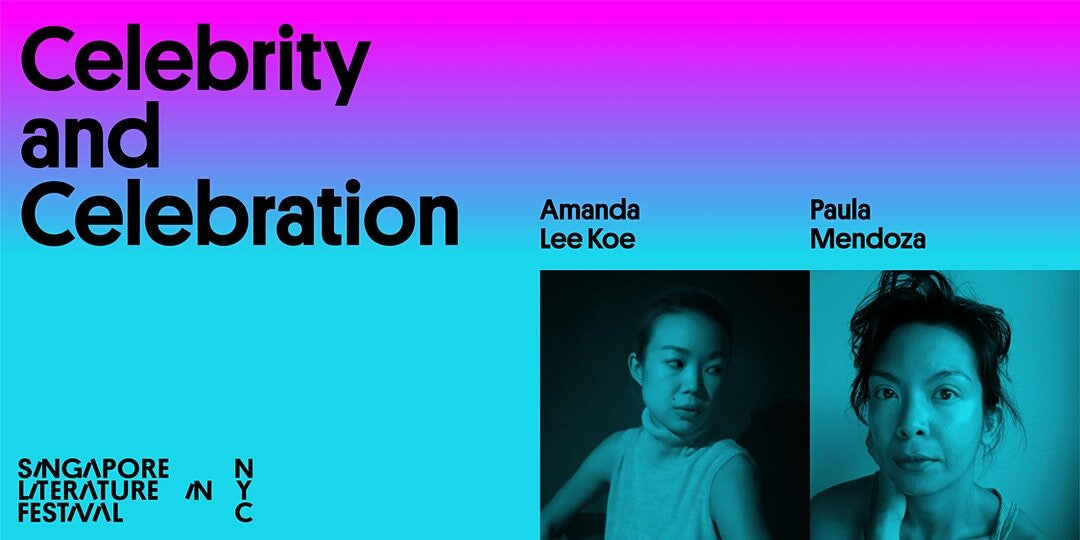
ONLINE EVENT: 2020 Singapore Literature Festival: Celebrity and Celebration
The word “celebrity” has its roots in the idea of celebration, which in turn calls up not just an honored person but also a festive place. How does contemporary writing, in prose and verse, take up the terms of celebrity and celebration? Amanda Lee Koe (Delayed Rays of a Star) and Paula Mendoza (Play for Time) read from their work and discuss whom and where they celebrate, or not, in their scintillating literary debuts. This event will be moderated by Diane Josefowicz.

WEBINAR SERIES: Migration, Cities, and COVID-19
The “Citizens and the City” webinar series seeks to provide a platform for exchange between urban activists, academics, and citizens who share an interest in how people can get involved in cities. The first webinar of this series deals with one of the most pressing realms of action: unacceptable living and working conditions of migrant workers, which have received sudden attention in different cities around the world during the coronavirus outbreak. The questions and challenges that aid organizations deal with in their ongoing work on migration go beyond the dormitories and include inclusion projects and gendered experiences of the pandemic. In this installment, speakers Cai Yinzhou, Shailey Hingorani, and Rieya Piscano will talk about their NGO work in relation to migration and COVID-19 in Singapore and Manila.

15th Singapore Graduate Forum on Southeast Asian Studies
The 15th Graduate Forum is one of the flagship events of the Asia Research Institute (ARI). This event provides a platform for graduate students from around the world working on Southeast Asia to communicate and interact, as they mature into the next generation of academic leaders. While several portions of the forum are for invited participants only, there will be three keynote addresses that are all open to the public:
July 22, 2020: Using Social Science as a Force for Good: Scholarship on, for, and as Activism (Meredith L. Weiss, Professor, State University of New York at Albany)
July 23, 2020: Making the Globe: A Cultural History of Science from the Bay of Bengal (Sujit Sivasundaram, Professor, University of Cambridge)
July 24, 2020: World History and the “Seduction of Quantification” – A View from Southeast Asia (Faizah Zakaria, Assistant Professor, Nanyang Technological University)
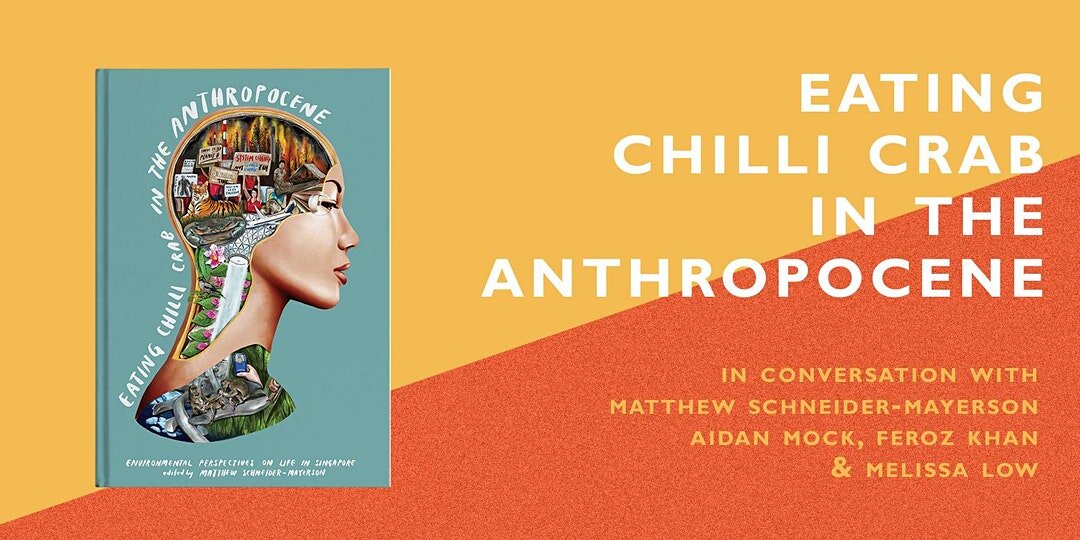
ONLINE EVENT: Eating Chilli Crab in the Anthropocene: Environmental Perspectives on Life in Singapore
What does it mean to eat chilli crab in the Anthropocene? Can we really expect to continue living the way we do in an unprecedented time of climate change? Can we ever be truly sustainable without addressing capitalism? Is individual action enough to sustain the kind of structural transformations that this moment demands?
Join Matthew Schneider-Mayerson, Aidan Mock, Feroz Khan, and moderator Melissa Low for the launch of Eating Chilli Crab in the Anthropocene: Environmental Perspectives on Life in Singapore, the first book to ground environmental issues in a Singapore context. We will discuss how our lives on this island are already deeply interconnected with the nonhuman world that flourishes all around us, the surprising environmental dimensions of life and culture in Singapore, and the kinds of changes that are necessary for humans – and Singapore – to survive and thrive in the Anthropocene.

WEBINAR: Singapore's Pandemic Elections: What's at Stake?
Singapore is heading into its general elections under unprecedented conditions. Campaigning and voting will take place despite the COVID-19 pandemic. Yet, the rules of campaigning and voting are unclear. Meanwhile, a new generation of politicians and political parties are emerging. How will these new players affect political representation, public debate, oversight of authority, minority rights, equitable public policies, and democracy in Singapore? Does Singapore have the right tools to address mis/disinformation and ensure fair competition? This webinar brings together a group of academics and community activists to discuss the key issues in Singapore. The webinar will highlight questions and concerns of young and first-time voters in Singapore’s electoral system.
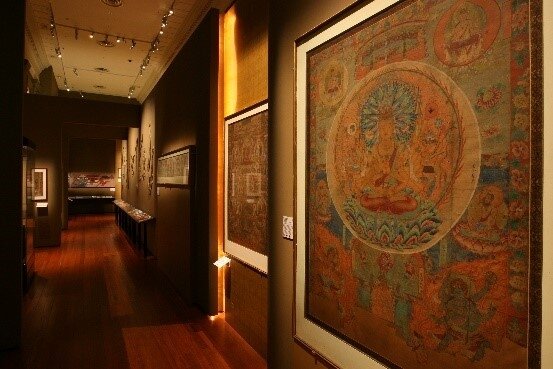
WEBCAST: Post-Modern Museum: The Case of Indian Art History and Heritage in Singapore
This webcast, the second program in Asia Society’s “At Home with ASHK: Museum Webinar Series,” brings you Dr. Gauri Parimoo Krishnan, a Singapore-based art historian, independent curator, and museum consultant who has contributed greatly to her city’s vibrant art and heritage sector over the decades. Drawing on her rich curatorial practice, Gauri will discuss the post-modern curating of diversity and plurality; with emphasis on South Asian art history, community history, and living culture and how they illuminate Indian representation in multi-cultural Singapore. Gauri will also discuss how collections, modern replicas, and digital interpretations put heritage in context for future generations. Joining the conversation will be Prof. Kathleen L. Wyma from the Department of Fine Arts at the University of Hong Kong.

WEBINAR: Privacy, Technology and Crisis Response: Case Studies from Australia, Singapore, Mainland China and Hong Kong
This Zoom webinar seeks to compare legal perspectives on the experience of technology, privacy, and COVID-19 crisis response in Australia, Singapore, Mainland China, and Hong Kong, which are not typically considered together. By comparatively exploring the legal frameworks for the COVIDsafe app in Australia, there is the potential to enhance international coordination in digital responses to public health crises, including issues such as digital pandemic surveillance measures and their legal frameworks, the tension/coordination between protecting privacy and combating COVID-19, and transnational movement of people/virus and lack of international cooperation of health information sharing.
(Image: Markus Spiske/Flickr)
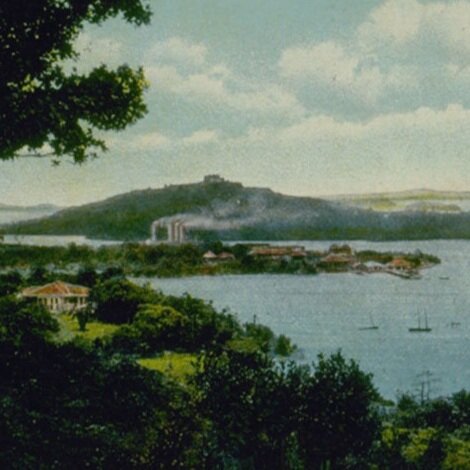
WEBINAR: The Thalassocracy of Longyamen During the 13th-14th Centuries With Evidence From Historical Sources and Empress Place Excavation in Singapore
This webinar, hosted by Temasek History Research Centre, will identify the type of civilization present in ancient Singapore during the 13th – 14th centuries. Wang Dayuan (1311–1350 AD) was known as one of the first Chinese traders to write about Longyamen. Based on Wang’s descriptions, Longyamen was long associated with piracy; an association later entrenched by subsequent travelers and researchers who cite his work. However, the activities and culture in Longyamen were unfamiliar to him, resulting in historical misconceptions. Evidence has shown that Longyamen was a political entity, and had powerful navy fleets and a prosperous economy.
The speaker, Tai Yew Seng, is a Visiting Fellow of THRC and a ceramic archaeologist who specializes in excavating and handling ceramic from kiln sites, shipwrecks, ruins, and tombs. He also has expertise in the Southeast Asian maritime trade with China.
![[CANCELLED] Tamils and State Urban Policies in Singapore and Kuala Lumpur](https://images.squarespace-cdn.com/content/v1/657a0c3cd9317f7b22ebbb67/1702497351429-2CONA7NS1789H8O2QU0B/10121316715_b965d3dc81_k.jpg)
[CANCELLED] Tamils and State Urban Policies in Singapore and Kuala Lumpur
UPDATE: This event has been cancelled.
--
Post-colonial states realized their desire to promote Singapore and Kuala Lumpur to the status of international metropolises at the expense of slums, which were demolished. In the context of multi-ethnic countries, this urban politic is not without consequences for minorities. In this presentation, Delon Madavan will present the consequences of these two states’ urban policies on Tamils’ spatial presence and how they are received by the members of the Tamil community.
(Image: naim fadil/Flickr)
